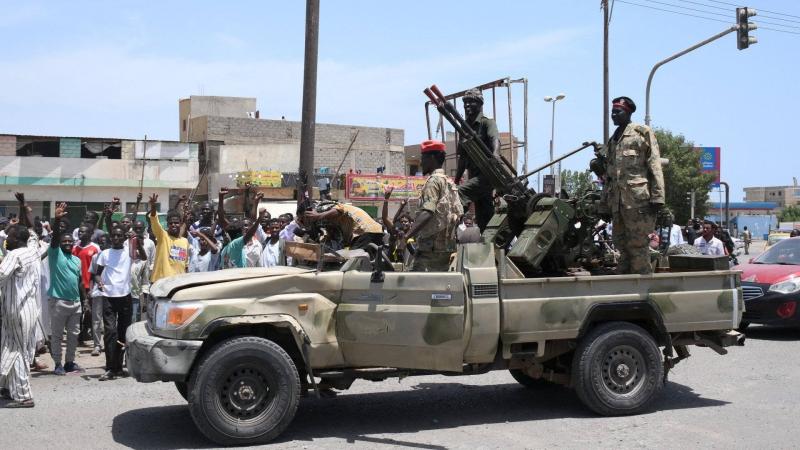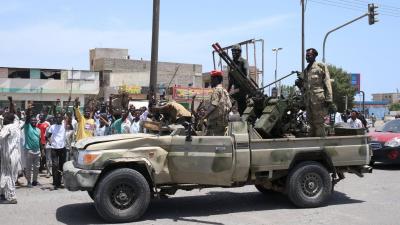On the third day of clashes between Sudanese army units and Rapid Support Forces, the intensity of the fighting escalated, with the Rapid Support Forces using anti-aircraft weapons for the first time, despite international appeals. The situation on the ground has become one of "street warfare within cities," involving heavy weaponry and warplanes while Sudanese citizens report a catastrophic humanitarian situation.
The rhetoric has intensified, with armed forces leader Abdul Fattah al-Burhan stating in an interview with CNN that Rapid Support Forces commander Mohamed Hamdan Daglo (Hemeti) has rebelled against the state and will be tried if captured. In a briefing to the UN Security Council, UN envoy to Sudan Volker Perthes expressed regret over the difficult situation that is impossible to predict. He spoke of the dire humanitarian conditions and emphasized efforts to stop the fighting and protect civilians, UN facilities, and international organizations.
Perthes announced a temporary halt to aid deliveries in Darfur due to the targeting and looting of international workers' homes, predicting that neither party is willing to reach a political solution. He refuted rumors regarding the deaths of Burhan or Hemeti, estimating that the death toll has reached 185, with more than 1,800 civilians and fighters injured. The White House has called for an immediate ceasefire between the army and Rapid Support Forces, confirming that U.S. officials are in contact with military leaders.
Since early morning, hospitals have run out of basic medical supplies, with some shutting down. Doctors have not been safe from violence, and universities such as the University of Khartoum have witnessed pleas for the evacuation of students among casualties. Reports of an ongoing humanitarian crisis are being coordinated with IGAD, the African Union, and regional organizations to achieve a ceasefire.
Conflicting information has emerged regarding control of military sites, with reports of Rapid Support Forces taking over Merowe Airbase while the Sudanese army remains positioned outside it, and fighting expanding to the Jabra area south of Khartoum. Amidst aggressive media narratives, UN Secretary-General António Guterres urged parties to de-escalate, highlighting an increasingly catastrophic humanitarian situation and calling for an immediate cessation of hostilities to restore calm and initiate dialogue.
A leader from the Umma Party indicated that neither side honored the announced ceasefire for three hours, specifically from 4 PM to 7 PM, as Khartoum erupted in violence in conjunction with iftar time, with sounds of shells and artillery reverberating. The Sudanese army invited journalists to the general command premises in Khartoum to confirm its control.
The Sudanese doctors' syndicate announced that "at least 97 civilians have been killed, and 365 others injured since the outbreak of clashes in Sudan." Alongside these grim figures, the preliminary Committee of Sudanese Doctors reported that "dozens of children are trapped in Ibn Auf Hospital near the army general command," adding that "the shelling caused the complete shutdown of Al-Shab Hospital and Khartoum Teaching Hospital."
The committee called on both fighting parties to "stop escalating the conflict," forming an emergency committee to address the situation while urging the international community to ensure that "the warring sides do not harm health facilities and to open safe passages." The committee appealed to humanitarian organizations for urgent assistance in evacuating the wounded, emphasizing that "bombing hospitals is a clear violation of international humanitarian law."
In response, the Sudanese Foreign Ministry stated that army commander Lieutenant General Abd al-Fattah al-Burhan ordered the dissolution of the Rapid Support Forces, declaring it a rebellious force. The ministry expressed appreciation for the efforts of Arab, African, and international communities aimed at easing the situation in the country, stating that what is occurring is "an internal matter that should be left to the Sudanese to achieve the necessary settlement among themselves without international interventions."
The ministry highlighted that all national, regional, and international mediation attempts to convince the Rapid Support Forces leadership to integrate into the armed forces had failed due to their obstinacy. The Sudanese air force conducted strikes against Rapid Support Forces in Khartoum while the military claimed to have regained some facilities, insisting control remains intact.
The International Committee of the Red Cross in Sudan expressed concern for civilian safety as clashes continue in densely populated areas. Previously, witnesses and residents reported that the army launched airstrikes on Rapid Support Forces camps in Khartoum and managed to destroy most of their facilities, asserting regaining significant control of the presidential palace while both sides claim dominance over various important installations in the city still engulfed in heavy artillery and gunfire.
Clashes erupted two days ago between the two sides after reaching an impasse regarding the integration of the Rapid Support Forces into the army. Witnesses noted that "Rapid Support Forces members remained inside Khartoum International Airport, which is under siege by the army, which refrains from strikes to avoid significant damage." The United Nations confirmed that "both sides had agreed on a humanitarian ceasefire allowing civilians to reach safe locations, but gunfire continued without either side adhering to the truce."




